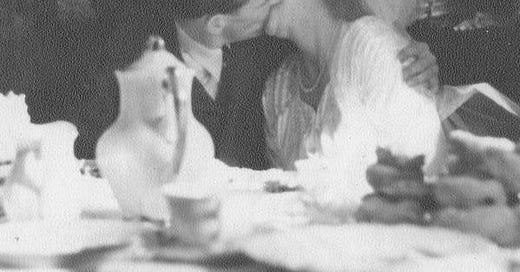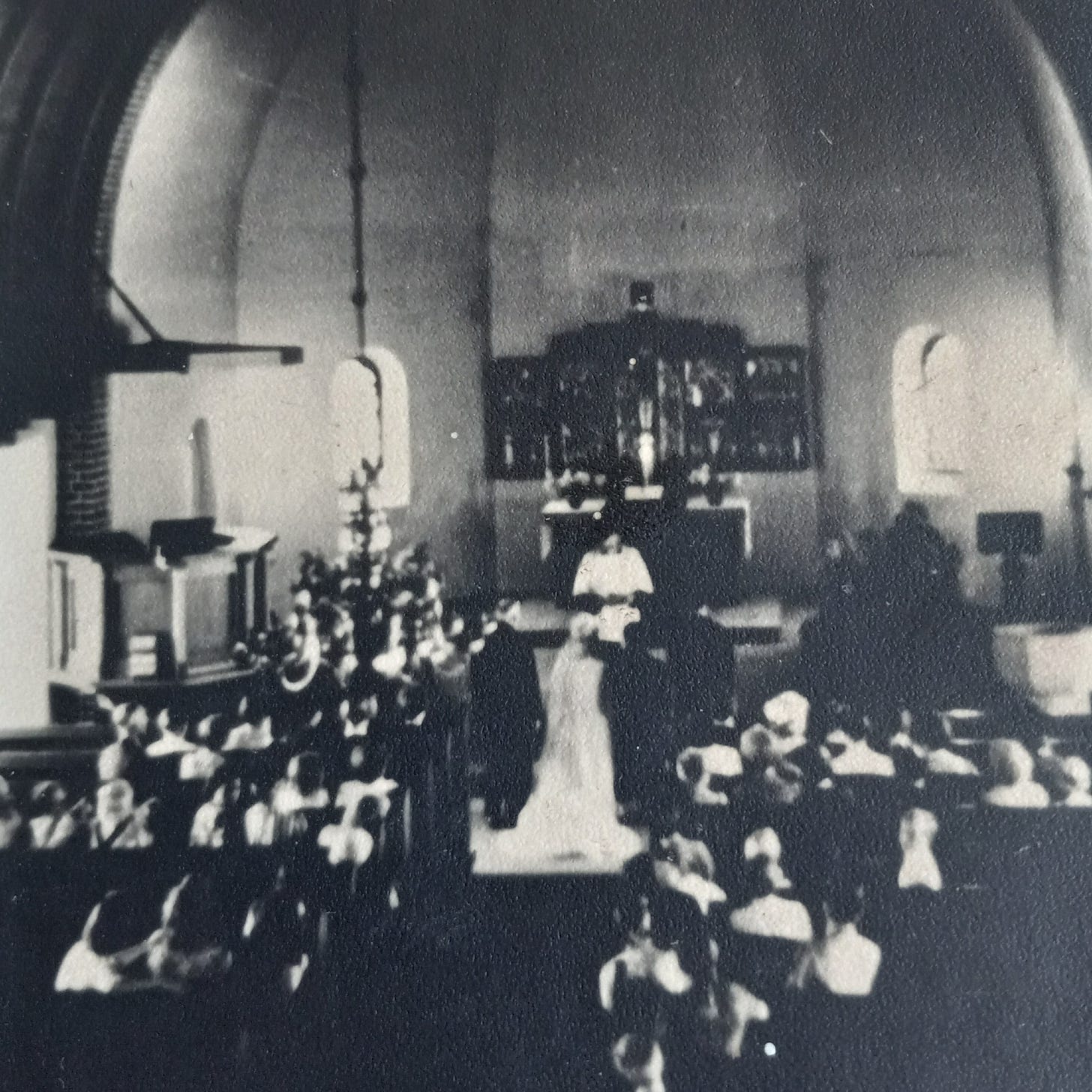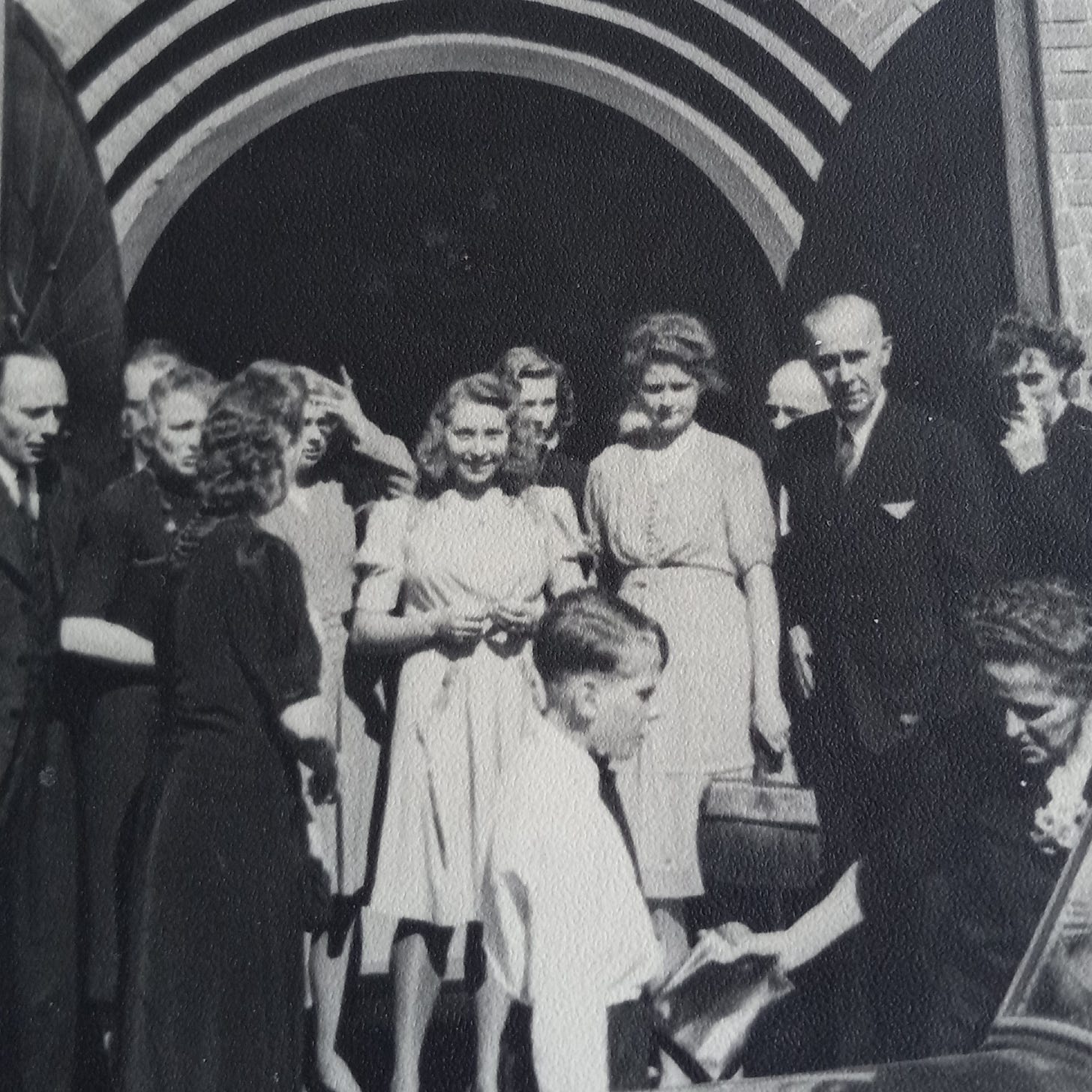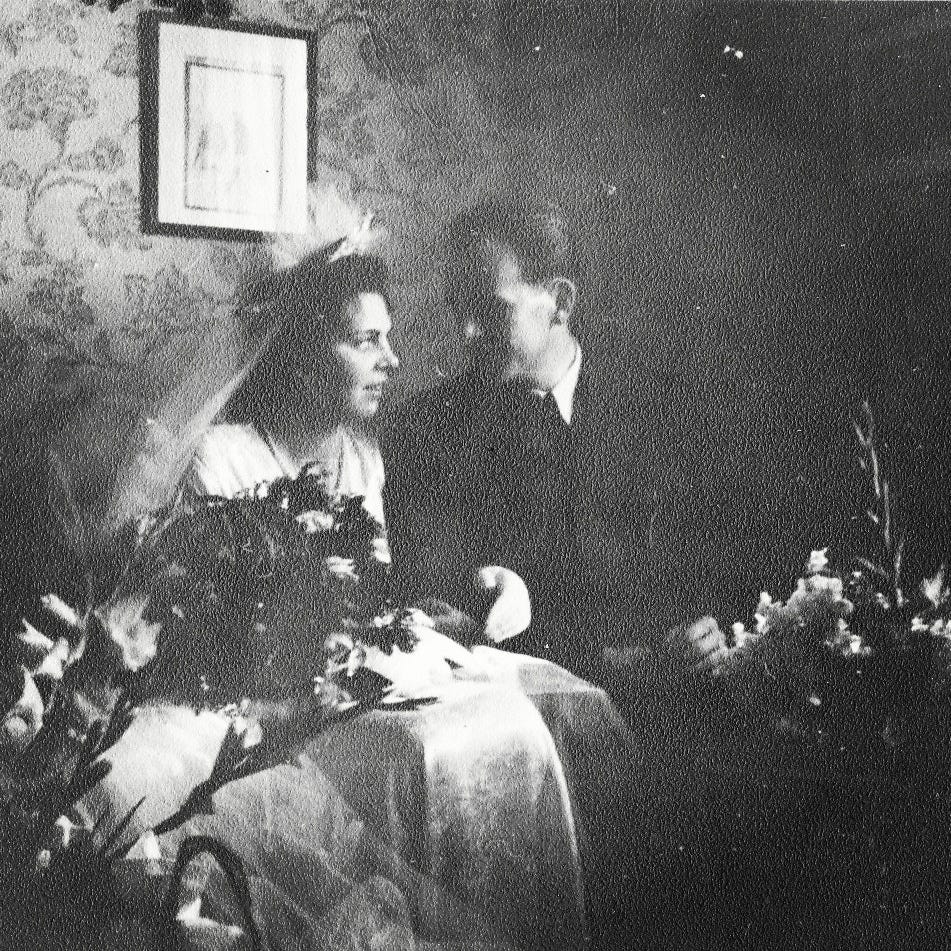Harry Leslie Smith recounts life in Hamburg 1947, a city still in rubble from WW2. But where hope for a working class future that included prosperity was strong enough to fall in love and marry.
Both are long dead, but today is my parent's 76th wedding anniversary. During their lives, my parents were able to celebrate together fifty-one wedding anniversaries before my mum died at the age of seventy-one from cancer, in 1999. Mum concluded her life as she had begun her marriage with a kiss, except this one was farewell to her husband.
That last kiss was to reassure my father that her love would endure, for him, even after she stepped over the border into nonexistence. My dad would not have made it through the night of her death without that kiss. Mum was the only one in our family who understood how emotionally fragile dad was, even at seventy-five. His grown-up boys did not get it because, for us, dad was a rock; we clung to him in both storm and sunny weather. My mother knew better, and a few days before dying, she tried to cryptically warn me that my dad would need help after she was gone.
I didn't understand at first. I had come to visit her, not knowing she'd soon be dead. It was thought she was just ill as she had been for years with rheumatoid arthritis, heart disease, and the stress of being a caregiver for my brother Peter who suffered from schizophrenia.
It was mid-morning; outside, birds sang in the trees while a June sun stretched through the window like a cat after waking from a nap. She was lying down on her bed, a paperback of Virginia Woolf's The Waves folded against her chest. “I am just a bit tired and need to rest.”
And me where was I? I was standing near her, but, in my thoughts, I was miles away. I was wondering if I was going to be late for a meeting at work and lamenting that my girlfriend had dumped me a month earlier. I was about to leave with a “See you later,” when my mother declared to me or perhaps herself, “I am glad I could give your father the love he needed to survive.” At the time, I did not realise then it was a clue to the intricacies of my parent's marriage, their relationship with each other, and in many ways, the debt that my father and her children owed her for a sacrifice made long ago.
When my parents married in Hamburg on August 16th, 1947, Europe was in a heatwave. The greatest war fought by the greatest generation was only two years done, and the world was still licking its wounds from that brutal conflict between good and evil. My mum was an 18-year-old German woman, and my dad was a 23-year-old lad from Yorkshire stationed in the city as part of Britain’s occupation force following the war. They both suffered from traumas caused by the war but also what they had experienced growing up as children.
My parents, like most young people, stumbled into their love affair by chance. My dad noticed my mother bartering away prized family possessions at a black market. He thought she was the most beautiful woman he had ever seen, and he lusted after her. So, he pursued her and eventually, they became lovers. My mum did not have as strong a feeling for my dad as he had for her when they were first lovers. Life was short, and she was young and wanted to taste as many pleasures as possible because she had seen so much death and come close to it herself. Over time, because of his devotion to her, and his endless ability to help her, and her family, in an unforgiving post-war world, the love my mother had for my father became strong enough to agree to his marriage proposal. Below is my father in Love Among the Ruins recounting his marriage to his Friede, my mother. Take care, John
Chapter 25
16 August 1947
On the way back to camp, I quietly sang to myself the song ‘I’m the Man Who Broke the Bank at Monte Carlo’. When I returned to my quarters, I was surprised to find that Sid and Dave had broken in and were waiting for me with a bottle of whisky.
Dave said, ‘I’d been saving this for a special occasion and since nothing came around, I thought why not drink it tonight.’
So my two friends and I drank whisky and toasted our old lives together. Sid told me: ‘You did all right, Harry. Didn’t get much loot out of Germany, but you did steal the prettiest girl.’
‘That I did,’ I replied.
‘What happens now to you and Friede?’ Dave asked.
I told them that RAF regulations required servicemen who married a foreign national be provided accommodation off base. ‘I’ll be chuffed,’ said Sid.
‘It’s a brilliant set-up.’ I explained that Friede and I were allotted rooms in a beautiful house, ten minutes from the base. The rent and all our living supplies would be paid by the RAF.
‘I wouldn’t let that get out,’ Dave warned me, ‘or everyone in the RAF is going to marry a German girl, just for the housing.’
‘Harry, you and Friede deserve it. Best of luck,’ Sid toasted me. ‘Now we’d better be off or else you’ll be over-sleeping on your wedding day.’
That night I didn’t sleep much due to the wine, the heat, and the anticipation of the wedding. Until the sun rose, I endured restless and disquieting dreams. I was relieved to be awake and away from my subconscious, which was like a cemetery where too many corpses were buried in shallow graves. In my dreams, I saw my Dad’s sad face. I wasn’t sure if the dream was wishing me well or warning me of rough times ahead.
Whether the dreams were omens or glad tidings, I realised that I still had to prepare for my wedding and ensure that all the food and drink were available for the reception. For a hefty bribe, I had made arrangements with the camp cook to provide all the food for the feast, from cakes to exquisite sandwiches. The three-tier wedding cake was made by a pastry chef attached to the NAAFI in Hamburg. Everything for the wedding reception was transported in on an RAF truck and delivered for 10.00am. I had press-ganged some other servicemen with promises of beer on a later date to help unload and set up the banquet tables, chairs, food and flowers for the reception. Everything was assembled in Maria Edelmann’s oversized bedroom as it was the only suitable space to fit 25 guests.
While we got to work putting the room together, Friede argued with her mother, who was arranging her hair and assisting with her make-up in the Gellersons’ room.
Frau Gellerson said to me: ‘You must be quick and go; it is bad luck to see the bride in the morning before your wedding.’
I left as quickly as I could. On my way out, I saw the men from the Malcolm Club deliver a giant keg of beer; they struggled to take it down to the cellar, where it could be kept cool during the sweltering August afternoon.
With haste, I returned to camp to get cleaned up for the ceremony. As I dressed, I started to shake and had to sit down and have a cigarette. I was overcome by my good fortune and the fear it was going to run out. How is it possible, I asked myself, that I fell into this joy, this great promise of better days? I didn’t know the reason except blind luck. There were so many others who missed out on life and were cut down before their time because of the Great Depression or the war. Yet I had somehow survived. I was granted by fortune or endurance or whimsy the chance to love and be loved in return. I had arrived at the entrance to a life worth living. ‘Don’t bugger it up,’ I said while brushing my hair tightly back.
When Stan and I rode up to the church in a jeep, I saw there was a growing crowd of inquisitive onlookers loitering around the entrance. Stan and I quickly rushed through the church doors and passed the assembled guests as we moved towards the altar. While I waited for Friede, Stan cracked jokes to me and the vicar.
It was hot inside the church and the air was stagnant. The padre was sweating and the organist looked uncomfortable on his stool. I mopped my brow with a handkerchief; Stan said, ‘Hope none of the neighbours nick the beer while we’re at church.’
After several more perspiring moments, I heard the doors open at the back of St Luke’s. The guests shuffled in their seats and then made an appreciative collective sigh. Friede had arrived with her foster father, Max. The music was struck and Friede walked slowly towards me. I knew that she was drinking in this moment. I knew that every step Friede took, she believed was a final and absolute negation of her stigma. Walking up that aisle, she wasn’t just coming towards me; she was walking away from her childhood sorrows, pains and humiliations. I wanted to turn around, but dared not. Stan glanced backwards and whispered to me, ‘Blimey, she’s beautiful.’
Finally, Friede and Max were beside us. The organ notes faded away like a feather caught in a breeze. Max ceremoniously relinquished Friede to my care. He whispered in my ear: ‘Be well and remember to be tender to my Friedl.’
Friede and I sheepishly smiled at each other. She whispered the words, ‘Ich liebe dich.’ The silk bridal gown magnified her loveliness and made her beauty appear timeless, untouchable, and seductive. Her beauty, her history, and her fragility humbled me as I stood in my RAF blue dress uniform. Friede held a bouquet of wild flowers, whose scent perfumed the air around us. It was a wonderful fresh aroma that made me think of our time walking in the botanical gardens.
Our wedding service wasn’t long but it was charged with emotion, laughter and human kindness. The chaplain joined us as man and wife, but said this was also a marriage unique for this town and for our garrison. It was the first post-war marriage between a Brit and a German. It was a signal, he said. It was a harbinger of peaceful days to come because if love could germinate between two young people from different cultures, the world was healing its wounds from the war. Finally, the vicar pronounced us man and wife. He blessed the union and we were wed.
Friede and I walked slow and steady to the church’s exit and on our way out, we received the adulation from the pews. I whispered a ‘thank you’ to Friede. She smiled and had tears in her eyes. For a brief second, I felt afraid of my new responsibility and I hoped I wouldn’t disappoint her. I didn’t want to muddle up destiny’s kindness towards me.
On the steps of the church, a wedding photographer took our picture. Once the pictures were taken, the guests were ferried to the reception in a fleet of Volkswagen taxis I had commandeered earlier on in the day for a hefty black-market bribe.
The feast, the feelings of good will, and the emotional atmosphere were never better at Maria Edelmann’s apartment than on the day of our reception. Everyone was content; no one brought any disgruntled and disjointed emotions to the party. There were toasts from Friede’s mother. There were speeches from Sid and Dave. Congratulatory telegrams arrived from my mother and sister. Friede translated them into German and read them out to the guests, who applauded my English family for their warm-hearted support.
We drank wine and beer, and ate cakes and delicate sandwiches. Cigarettes were shared and hands held. I felt proud that I had orchestrated this feast of love for Friede, her family and her friends. Half-way through the reception, Friede slipped out of the room. She quickly returned and sat beside her mother. They talked in low voices and then hugged each other warmly. Friede walked over to a painting hanging on the wall and placed a small wallet-sized photo of her father Fritz along the edges of the frame. She raised her glass and announced:
‘To my mother who loved me in dangerous times; to my foster mother for caring for me; to my foster father who loved me as his own.’ The wedding table broke into applause at the dedications. When the clapping stopped, Friede continued: ‘I raise my glass to Harry, who will love me until the end of days, and I shall love him whether the sea is in storm or the waters calm.’
I apologise, but this is where the paywall begins because, in this cost-of-living crisis world, things are desperate for many, including me. Harry's Last Stand as a substack is about preserving the legacy of Harry Leslie Smith and his Don't Let My Past Be Your Future message, which I helped him communicate to the world whilst he was alive and continue to impart since he died in 2018. However, if you are skint- please message me, and I will send you a link to read the rest for free. Take care and solidarity, John.
Keep reading with a 7-day free trial
Subscribe to Harry's Last Stand Newsletter to keep reading this post and get 7 days of free access to the full post archives.







